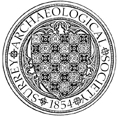Prehistoric Group Members Presentations
A free Zoom event has been arranged where three members give short presentations about their work.
Bill Powell will discuss his current research on Mesolithic and Neolithic mobility in Pembrokeshire as affected by the geology of the region
Jan Blatchford will talk about her involvement with the excavation at the Ness of Brodgar, Orkney
James Crouch will present How to Build a Roundhouse: A Volunteers Experience


